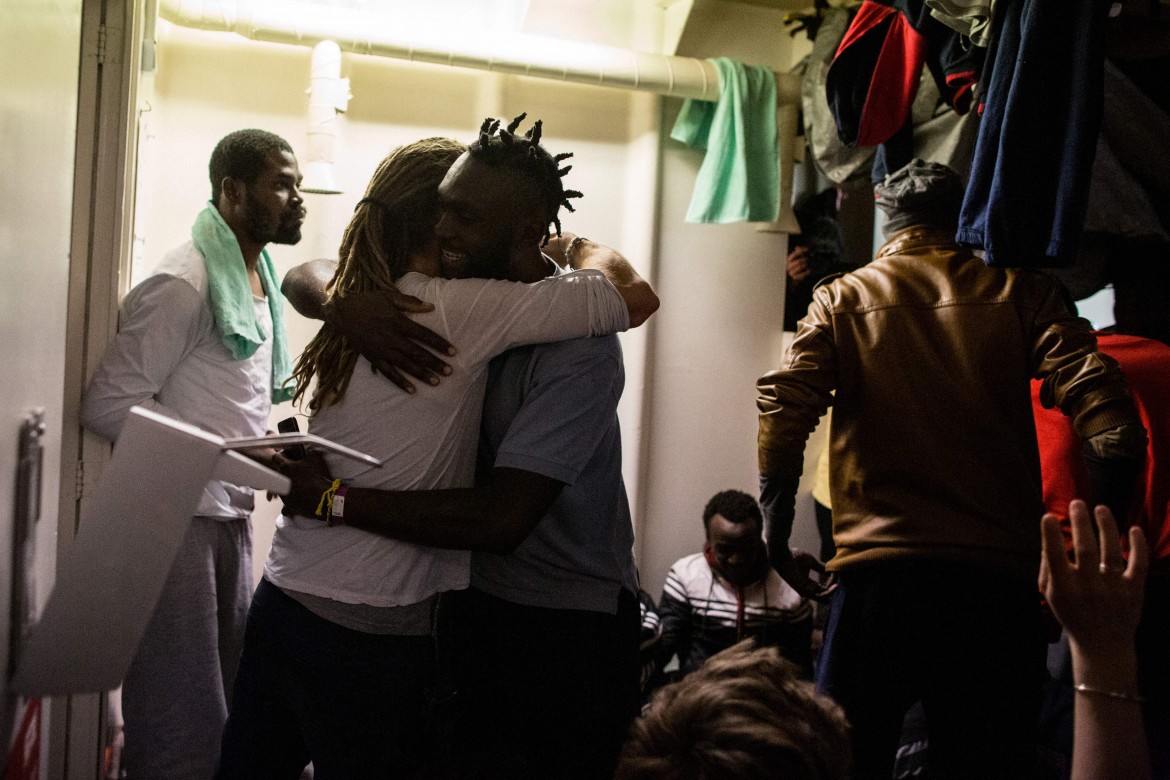Commentary
The government can’t hide Italy’s moral shipwreck
Ignorance of the facts, sheer disregard for human rights, cynical electoral speculation—this is the political and ideological system that the Sea Watch and Sea Eye NGOs have been up against.

“We are not fish, we are not sharks, we are human beings like everyone else,” Bob Kiangala told Reuters, a refugee who had fled an armed conflict in Congo and had been stranded aboard the Sea Watch 3 for 19 days.
Around noon yesterday, the Maltese Prime Minister Joseph Muscat announced that the European Union had reached an agreement regarding the plight of the two boats owned by the non-governmental organizations Sea Watch and Sea Eye, which had been asking the authorities of European countries to allow them to safely land at a port for weeks now. The 49 refugees rescued by the NGOs were then transferred from the two ships to Maltese military vessels and finally brought to shore, as they will be received by eight different European countries. The agreement also includes the 249 migrants that Malta had rescued since late December, and whose redistribution was the indispensable condition for the Maltese government to agree to the landing. These are the facts so far.
But what was Italy’s role in this sad and cruel affair?
In the almost 20 days of maritime ordeal for the 49 castaways, the Italian institutions, in the persons of those who have political responsibilities on decisions relating to landings, made their positions embarrassingly clear.
“The women and children, they are ten people in total. The EU is hiding its head in the sand. In the face of this shameful lack of engagement, we are ready to welcome them,” said the vice-prime minister, Luigi Di Maio, but only after two full weeks of the refugees being stranded at sea. It took several more days of inaction for Danilo Toninelli, the Minister of Infrastructure and Transport, to get on his own high horse: “Women and children, that’s fine with me, even 15 of them. Then we will say to all Europe that they should be ashamed of themselves.”
The bizarre idea of the purported moral lesson that Di Maio and Toninelli would teach Europe was based on the assumption that Italy had acted with irreproachable ethical standards in refusing to allow any landing in the first place, and was now ready to make an extraordinary effort, a remarkable act of sovereign kindness, because of the overwhelming sympathy that women and children in peril can stir up in even the coldest of hearts. The implicit forced separation of the families that this would imply—compounded to the sorrows of so many days stranded at sea—was passed over as if it was an insignificant detail, before an unexpected outbreak of common sense seems to have brought Prime Minister Conte himself to a more reasonable position, who spoke of a willingness to act “for the families.”
Furthermore, all this moral posturing conveniently swept under the rug the fact that the organization with actual responsibility, the Sea Watch NGO, had said from the outset that it was unwilling to accept that—for instance—a mother and son would be sent to Vercelli while the father was sent to Valencia. After this long ordeal, a solution was finally reached yesterday that would not involve such absurdities, although the details still need to be fully worked out. However, as regards our country, Salvini reiterated his position of “absolute opposition to any new arrivals in Italy,” in clear opposition to the deal agreed to by the prime minister. Thus, Italy’s participation in the resolution to this crisis, after much ridiculous posturing, is still uncertain—and, in any case, bound to bring violent turmoil to the government majority, even more so than before.
On the other hand, the conspiracy theories being pushed by Minister Toninelli have thankfully sunk without a trace. He had accused the two NGOs of failing to “return” the castaways into the hands of those they were running from: the Libyan militias who run the migrant detention centers. In a convoluted interpretation that recalled the old saying that “every journey is a return,” Minister Toninelli put forward an elaborate alternative reconstruction of the two rescues by Sea Watch and Sea Eye, one that is contradicted outright by the testimonies provided by the two NGOs and by the ship’s logs, which don’t record any supposed instructions received from the so-called Libyan Coast Guard.
Even if Toninelli’s conspiracy-tinged version of events was true, the minister’s argument was, in essence, that the refugees and migrants should return to the detention centers from which over half had fled to try to cross the Mediterranean. These are the very same centers that the latest UN report denounced as places full of “unimaginable horrors”: arbitrary imprisonment, beatings, burning with hot irons, torture with electric cables, sexual harassment and violence.
Ignorance of the facts, sheer disregard for human rights, cynical electoral speculation—this is the political and ideological system that the Sea Watch and Sea Eye NGOs have been up against. They showed great wisdom in the process, and finally, after much suffering and frustration, managed to achieve their key objective.
Finally, to stir the hornet’s nest a little bit, one cannot fail to remark that maybe the reason this affair has outraged the Lega so much is because of some prodding from their collective unconscious: the number of migrants, 49, is an ominous one for them, recalling the sum of 49 million euros they had to repay last year to the state after a scandal that brought them much embarrassment and shame.
Originally published at https://ilmanifesto.it/il-naufragio-dellitalia-che-il-governo-vorrebbe-nascondere/ on 2019-01-10
